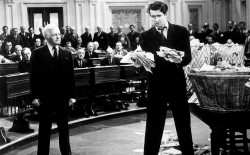Cinema | October 15th, 2015

One of the key classics of 20th century cinema is Frank Capra’s “Mr. Smith Goes to Washington,” yet another of the major films premiering in 1939. It earned 11 Academy Award nominations, but amazingly did not win a single category.
Nevertheless, it’s a film that should be shown theatrically every campaign and election year in every country. The moving story of political corruption and cynicism clashing with sincere political idealism and patriotism documents the attitudes of 1930s America, but applies to all ages from ancient Greece and earlier to the present day. It’s also a good presentation of the power of the media as well as its own blasé cynicism.
James Stewart has one of his most memorable roles as an average, intensely patriotic but naïve young man from the upper Midwest who suddenly finds himself appointed to the U. S. Senate after the death of a senator has the state’s political machine scrambling to find an appropriate substitute they can count on not to upset the status quo.
He is even more overawed by seeing the city of the nation’s founders first-hand than by his own new political status, soon making him a laughing stock. To keep him out of the way, the establishment recommends he write up his own new bill to present to the Senate, something he takes to enthusiastically, proposing a summer camp to help the Boy Rangers club he ran back home, as well as disadvantaged children across the country.
Unknown to Smith and to his more experienced colleagues, the piece of ideal land he has specified is already earmarked on another bill as the site of a new dam, which will provide lucrative kickbacks for the state’s political bosses including the much-admired senior senator (Claude Rains). Once this news is revealed, and Smith refuses to cooperate with the political machine despite threats on both career and personal reputation, the heart of the plot begins. Smith is encouraged to do all he can by his secretary (Jean Arthur) and a cynical reporter (Thomas Mitchell) to fight the political graft in his state.
Capra brilliantly handles the screenwriters’ expert blend of conflict in personal characterizations, shattered political ideals and vicious political manipulation, always giving the film a strong emotional heart that excuses some sentimental overindulgences here and there. Other standouts in the cast include veteran character actors Harry Carey, Edward Arnold and Guy Kibbee, among others.
Sony’s Blu-ray, released in December 2014, is beautifully transferred from their recent and meticulous 4k scan and restoration. The film-like crisp, glowing black-and-white image looks like you’re seeing it in a theatre on opening night with its rich contrast and lack of film damage. Minor scratches and slightly soft images are a byproduct of original duping and wear in stock footage inserts and montages. Audio is very clear and clean, quite good for a 1930s soundtrack.
Bonus features are thorough and numerous, with an attractive digibook packaging including photos and a good essay, among other things. The on-disc extras are mostly standard-definition, ported over from DVD editions, including a commentary with Frank Capra, Jr., five featurettes on Capra and the film, plus a nearly two-hour documentary on Capra hosted by Ron Howard. There are also two original trailers in HD, one with footage not used in the final release of the film.
Movie: A / Video: A+ / Audio: A / Extras: A-
February 16th 2026
February 16th 2026
February 9th 2026
February 4th 2026
January 26th 2026


_(1)__293px-wide.jpg)


